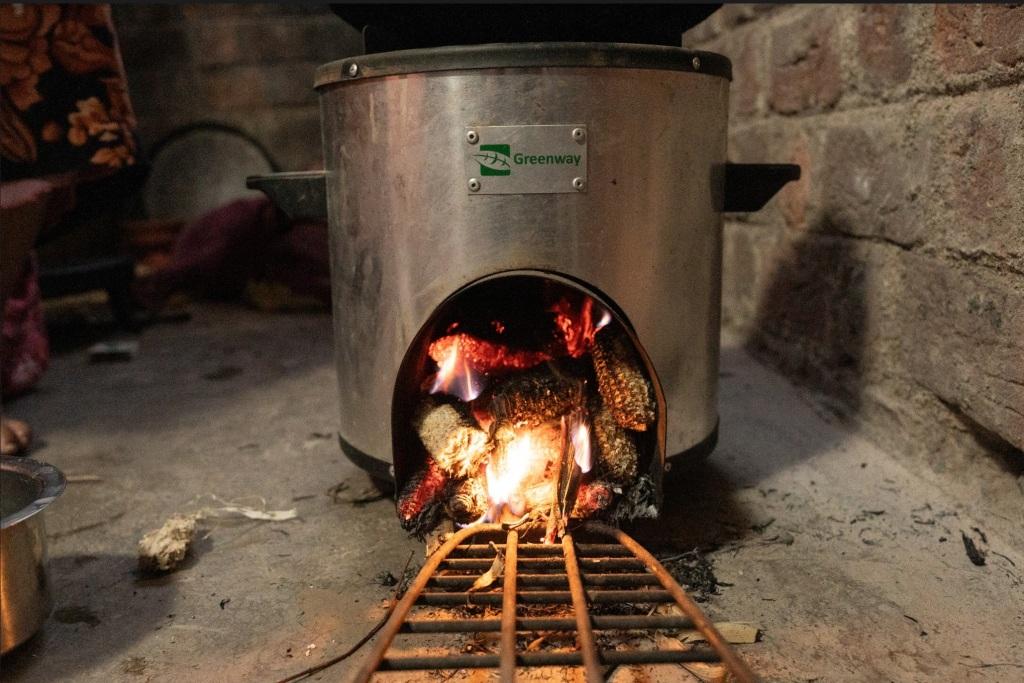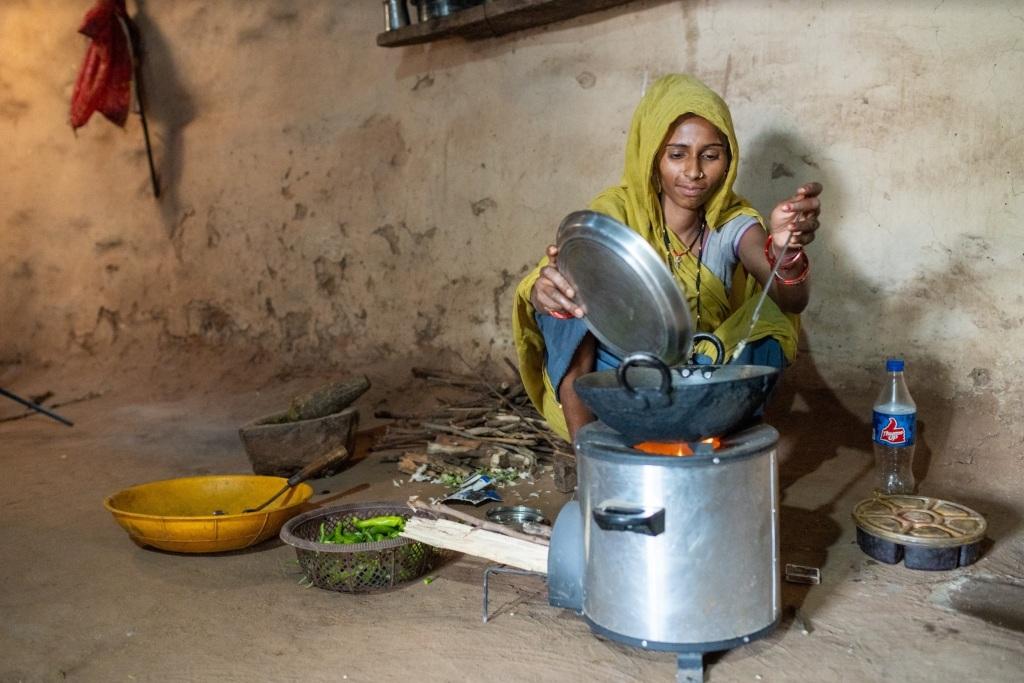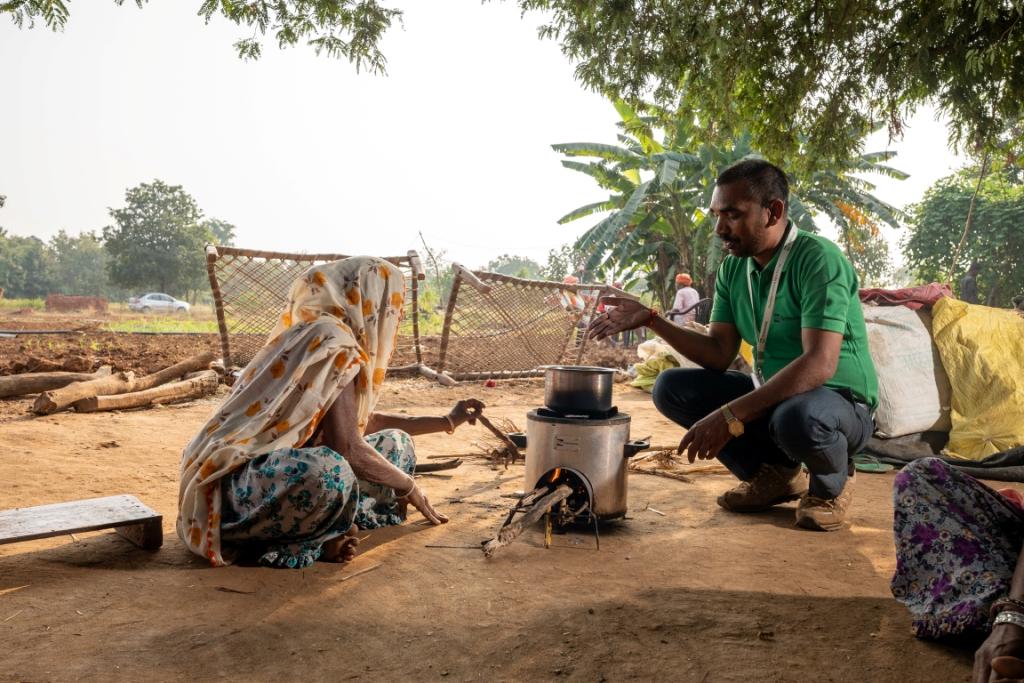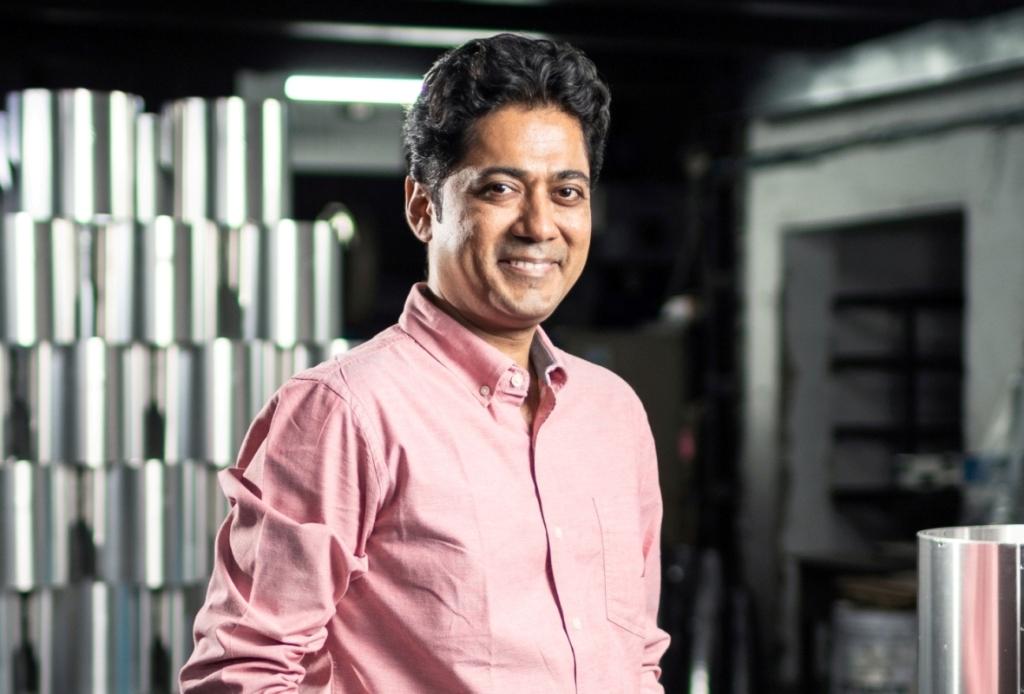 Greenway Grameen stands as a shining example of the power and potential of sustainable innovation. With their simple yet immensely effective product- improved cookstoves- they are transforming cooking practices across rural India, offering efficient, smoke-free alternatives to traditional mud stoves. With over 2.5 million cookstoves sold, Greenway Grameen has enhanced the health and wellbeing of millions of individuals by ensuring affordable access to clean energy solutions. Greenway stoves have also been part of various climate action projects leading to reduction of over 10 million tons of CO2.
Greenway Grameen stands as a shining example of the power and potential of sustainable innovation. With their simple yet immensely effective product- improved cookstoves- they are transforming cooking practices across rural India, offering efficient, smoke-free alternatives to traditional mud stoves. With over 2.5 million cookstoves sold, Greenway Grameen has enhanced the health and wellbeing of millions of individuals by ensuring affordable access to clean energy solutions. Greenway stoves have also been part of various climate action projects leading to reduction of over 10 million tons of CO2.
In this interview with TheCSRUniverse, Mr. Ankit Mathur, Co-founder, shares the story of the inception and growth of Greenway Grameen. The journey, though challenging, has been adorned with accolades and vital partnerships. Their early supporters, including esteemed organizations like the Intel Global Challenge, Echoing Green Foundation, and Ashden, laid the groundwork for its growth. Strategic funding from Acumen, Asha Impact, and collaborations with the Clean Cooking Alliance propelled the organization forward. Their recent collaboration with the Asian Development Bank, underscores their commitment to scale and accessibility, aiming to reach 20 million households by 2030.
As Ankit eloquently articulates, Greenway Grameen's journey is far from over. With a steadfast focus on innovation, community engagement, and sustainable growth, the organization is poised to continue its transformative impact, ensuring a greener, healthier future for generations to come.
Read the full interview for deeper insights:
Q. We’d like to begin with your personal journey from being an IIM Ahmedabad graduate to starting Greenway Grameen- what factors prompted you to venture on this relatively non-traditional path?
A. As I was studying at IIM Ahmedabad, I had the opportunity to interact with an amazing cohort of batchmates. However, I wasn’t too thrilled to take up a regular job at a large company as is the norm and started up with a few friends right after graduating. We quickly understood that a white space existed in the sustainability and climate action space. We started focusing on access to clean energy and carbon offsets while engaging with a variety of stakeholders.
The idea for Greenway came about when we noticed that large majority ofrural households were using traditional mud stoves, which were not only inefficient but also posed serious health risks due to the smoke they produced. This was early 2009 and we realized that there was a significant gap in the market for efficient cooking solutions tailored to the needs of rural households. Our backgrounds in engineering greatly helped in product design and prototyping. This was the genesis of Greenway Grameen.
Starting Greenway was certainly a non-traditional path, especially for an IIM graduate. However, the potential for positive impact was enormous. It was a chance to improve the health and quality of life for millions of people, and at the same time, contribute to environmental sustainability.
Q. Please tell us about the mission and vision of Greenway Grameen and how has the organisation evolved so far?
A. Our vision is to design and deliver high-quality, affordable, and user-friendly products that meet the unique needs and constraints of rural households. We believe that well designed products should not be restricted to urban or high-income customers. Our flagship products are Greenway stoves that provide rural households access to efficient cooking energy.
We are on a mission to reach 20 million households by 2030 with innovative products. While we currently focus on energy access, we believe we can provide better quality of life to our customers through interventions across a number of product categories across health, water, information services, financial services etc.
Q. Your work has garnered some sought after recognitions from multiple organisations. Could you tell us about your earliest supporters and which partners/fundings were the most significant in the organisation’s growth journey?
A. It is heartening to look back and feel good about the recognition that we’ve received. However, when we started Greenway, we knew that better cooking for rural households is a graveyard of failed experiments. We have been fortunate to receive funding support and credence in our early years from the likes of Intel Global Challenge at UC Berkeley, Echoing Green Foundation, and Ashden. This support helped us develop a product format that users were willing to switch to for the long term.
The next challenge was making this design affordable and scale the supply chain. We raised capital from Acumen and Asha Impact (now Asha Ventures) to scale distribution. We also received grant funding from Clean Cooking Alliance that helped us set up India's largest cookstoves factory, enabling us to mass produce very efficiently.
Q. Please provide some basic information about your clean cooking stoves- their benefits over traditional mud chulhas, their pricing and availability in the market? Are there any companies offering similar products?
 A. Our improved cookstoves are designed to be a modern replacement for traditional mud stoves (chulhas). They are engineered to work with all types of solid biomass fuels such as wood, crop waste, coconut waste, and others. They are highly fuel-efficient, offering up to 65% fuel savings and significantly reduce smoke emissions by up to 70%, leading to improved indoor air quality and better health outcomes for users. The higher efficiency also means faster cooking times, saving valuable time for the users.
A. Our improved cookstoves are designed to be a modern replacement for traditional mud stoves (chulhas). They are engineered to work with all types of solid biomass fuels such as wood, crop waste, coconut waste, and others. They are highly fuel-efficient, offering up to 65% fuel savings and significantly reduce smoke emissions by up to 70%, leading to improved indoor air quality and better health outcomes for users. The higher efficiency also means faster cooking times, saving valuable time for the users.
We are available across India and also export to Sub-Saharan Africa. While there are a small number of other companies offering similar products, Greenway Grameen differentiates itself through its focus on user-friendly design, affordability, and robust after-sales service. We continuously innovate to meet the evolving needs of our customers and to stay ahead of the competition.
Q. You have already sold more than 2.5 million improved cookstoves. What does this figure mean in terms of the impact on the health of women and the environment?
A. The sale of over 2.5 million improved cookstoves is a significant achievement that impacts over 10 million lives directly across rural households.Improved cookstoves are designed to reduce smoke and harmful emissions, which are often associated with traditional cooking methods. Women, who are typically responsible for cooking, are particularly exposed to these health hazards. Greenway stoves have made kitchens a safer place to cook for millions of women and save them time for enjoying a better quality of life.
From an environmental perspective, improved cookstoves are more energy-efficient and require less fuel than traditional stoves. This leads to a decrease in the demand for firewood or charcoal, helping to reduce deforestation and habitat destruction. Over the years, Greenway stoves have been part of various climate action projects leading to reduction of over 10 million tons of CO2.
Q. Can you share some insights into your partnership with ADB- what are the outlines of this partnership and how will it help you scale up your operations and ensure wider accessibility of your products?
A. The Asian Development Bank (ADB) has given a line of credit to Greenway to produce and distribute 1 million improved cookstoves to rural households across India. The financing also includes a $3.25 million first-loss liquidity reserve from the Climate Innovation and Development Fund (CIDF), administered by ADB. This is a first of it’s kind climate finance deal where a large Development Finance Institution (DFI) has enabled scaling climate action for enabling energy access in rural settings.
This partnership is based on a shared vision of promoting sustainable development. With ADB’s backing, we can scale up our operations more effectively and the financial support allows us to make the Greenway Jumbo Stove more accessible to rural households by providing over 80% upfront subsidy to participating households.
Q. The partnership also involves selling carbon credits in the international market. How would the credits be accounted for and sold and how will the proceeds be utilised?
A. The reduction of carbon emissions is governed by standard methodology, periodic monitoring and verification by an accredited third-party on a half-yearly basis. The process is comprehensive encompassing data requirements, field monitoring and visits to lend enhanced credibility to the project outcomes. Greenway has implemented projects across methodologies of Gold Standard, Verra and UNFCCC. There is tremendous merit in investing in similar community linked carbon mitigation projects due to the social and climate impact that they have.
Any large scale project requires continuous infusion of funds for the project to progress and sustain. In addition, there is investment in terms of building a team and training them to engage with the communities. Given that the cookstoves are distributed to the community at over 80% subsidy, the carbon credits accrued for these projects shall help in recovering the cost and scaling the operations.
Our goal remains to positively impact communities through products that promote good health & well-being and gender equality.
Partnering with carbon credits are accounted for based on the amount of carbon dioxide emissions that our improved cookstoves prevent. This is calculated using established methodologies approved by international carbon standards such as the Verified Carbon Standard or the Gold Standard. Each credit represents one tonne of carbon dioxide that has been prevented from entering the atmosphere.
Once the carbon credits have been accounted for and verified by an independent third party, they can be sold in the international carbon market. This could be to companies looking to offset their own emissions, governments meeting their climate goals, or other organizations interested in supporting sustainable projects.
The proceeds from the sale of carbon credits are reinvested back into our operations. This could involve scaling up production, investing in research and development, expanding into new markets, or improving accessibility of our products. A portion of the proceeds may also be used to support community initiatives in the areas where we operate, further contributing to our mission of promoting sustainable living and improving health.
Q. Your website mentions that 2 out of 3 Indian households use biofuels for cooking. Is this the current status? How effective have government initiatives like UjwalaYojna been in promoting clean cooking practices?
A. About 2.4 billion people globally lack access to clean cooking solutions. The Govt has provided over 100 million LPG connections to the rural households as of Jan 2024 through the Pradhan Mantri UjjwalaYojna. Despite this progress, as per the latest National Family Health Survey Report NFHS -5, only 43.2% of rural households in India use clean fuels for cooking. Greenway’s work continues alongside the efforts by the government.There are millions of households that continue to be dependent on biomass for cooking.
Q. In what ways does Greenway Grameen engage with communities and educate them on clean cooking practices? Have there been any insights during this process that have helped you improve your own approach?
 A. With a team of nearly 250 people on the ground, our people engage with the communities directly. The Greenway staff systematically visit the villages including those with a higher density of tribal population and marginalised communities. The team conducts demos of the improved cookstove highlighting how switching from a mud cookstove to an improved cookstove can lead to less usage of wood apart from the cooking time saved daily.
A. With a team of nearly 250 people on the ground, our people engage with the communities directly. The Greenway staff systematically visit the villages including those with a higher density of tribal population and marginalised communities. The team conducts demos of the improved cookstove highlighting how switching from a mud cookstove to an improved cookstove can lead to less usage of wood apart from the cooking time saved daily.
Being in the business since 2011, I can say there has been immense learning engaging with the communities. Our product has undergone improvisation over the years based on the feedback received. The feedback has also helped us devise ways to work more closely with a variety of partners while sharpening our outreach, especially helping solve reach and affordability of the product for households that need it the most.
Q. Looking ahead, how do you envision the growth of Greenway Grameen- not only as an organization but also in terms of the impact it will make on communities and the environment?
A. Looking ahead, we target reaching over 20 million households by 2030, up from over 2.5 million at the moment. We are actively working to expand our reach as well as product portfolio to serve rural households. We are actively investing in R&D to achieve the same. As we reach newer areas, we also aim to create more jobs within local communities, especially for women.
We have a clear focus on tracking our impact across Sustainable Development Goals and are actively working towards informing all our stakeholders, internal as well external of the importance of the same. As effects of climate change become even clearer, we believe we will be able to deliver across a variety of mitigation and adaptation efforts.
To conclude, I believe that Greenway Grameen will continue to grow as a social enterprise that makes a significant positive impact on communities and the environment. We are always looking at ways of making positive impact on the environment and communities that we work with. The success of Greenway stoves is just a beginning!





 Greenway Grameen stands as a shining example of the power and potential of sustainable innovation. With their simple yet immensely effective product- improved cookstoves- they are transforming cooking practices across rural India, offering efficient, smoke-free alternatives to traditional mud stoves. With over 2.5 million cookstoves sold, Greenway Grameen has enhanced the health and wellbeing of millions of individuals by ensuring affordable access to clean energy solutions. Greenway stoves have also been part of various climate action projects leading to reduction of over 10 million tons of CO2.
Greenway Grameen stands as a shining example of the power and potential of sustainable innovation. With their simple yet immensely effective product- improved cookstoves- they are transforming cooking practices across rural India, offering efficient, smoke-free alternatives to traditional mud stoves. With over 2.5 million cookstoves sold, Greenway Grameen has enhanced the health and wellbeing of millions of individuals by ensuring affordable access to clean energy solutions. Greenway stoves have also been part of various climate action projects leading to reduction of over 10 million tons of CO2. A. Our improved cookstoves are designed to be a modern replacement for traditional mud stoves (chulhas). They are engineered to work with all types of solid biomass fuels such as wood, crop waste, coconut waste, and others. They are highly fuel-efficient, offering up to 65% fuel savings and significantly reduce smoke emissions by up to 70%, leading to improved indoor air quality and better health outcomes for users. The higher efficiency also means faster cooking times, saving valuable time for the users.
A. Our improved cookstoves are designed to be a modern replacement for traditional mud stoves (chulhas). They are engineered to work with all types of solid biomass fuels such as wood, crop waste, coconut waste, and others. They are highly fuel-efficient, offering up to 65% fuel savings and significantly reduce smoke emissions by up to 70%, leading to improved indoor air quality and better health outcomes for users. The higher efficiency also means faster cooking times, saving valuable time for the users. A. With a team of nearly 250 people on the ground, our people engage with the communities directly. The Greenway staff systematically visit the villages including those with a higher density of tribal population and marginalised communities. The team conducts demos of the improved cookstove highlighting how switching from a mud cookstove to an improved cookstove can lead to less usage of wood apart from the cooking time saved daily.
A. With a team of nearly 250 people on the ground, our people engage with the communities directly. The Greenway staff systematically visit the villages including those with a higher density of tribal population and marginalised communities. The team conducts demos of the improved cookstove highlighting how switching from a mud cookstove to an improved cookstove can lead to less usage of wood apart from the cooking time saved daily.












.jpg)



